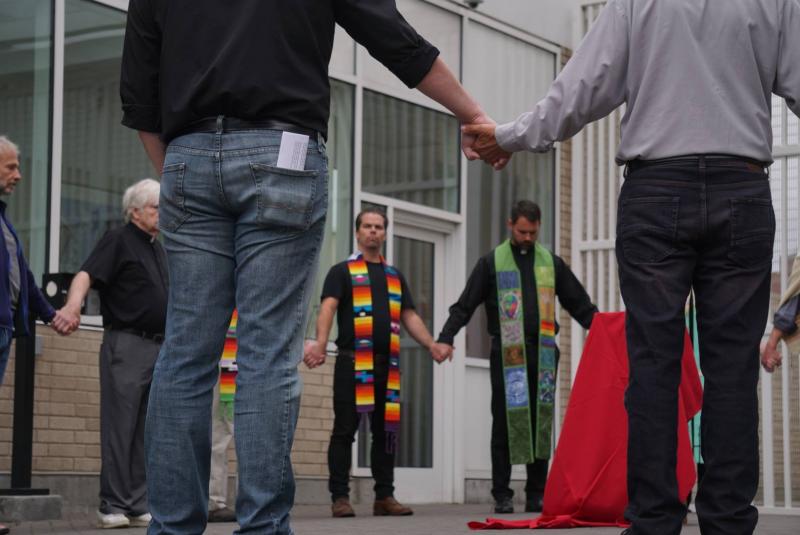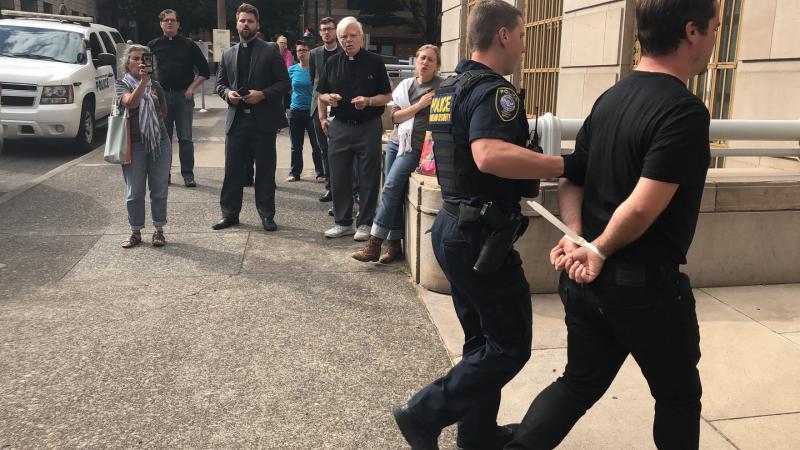Thursday morning we heard the good news: Albert, a Cameroonian man, had been released the day before from a federal penitentiary downstate. For months he sat in the Sheridan federal prison, wondering alongside hundreds of others if he’d ever see the light of day again.
We also heard the harrowing story of Luis, a father of two young children, who was separated from his wife and kids on the southern U.S. border four months ago, after fleeing despairing conditions in Michoacán, Mexico. After being separated from his family, he was thrown into a cold freezer cell for hours. He too was released and left Oregon yesterday to be reunited with his family. It was a torturous spell that far too many of our neighbors looking for safe and better opportunities have experienced in the wake of the Trump administration’s cruel “zero tolerance” immigration policies.
These are just two hopeful stories that continue to inspire faith-rooted action here in Portland, Ore., as hundreds of folks with the Interfaith Movement for Immigrant Justice continue to cry out “Let Our People Go!”
Knowing that so many more suffer from inhumane incarceration, I joined with more than 20 interfaith clergy from around Oregon and got arrested “for failure to comply” by sitting in a prayer circle in front of the main gates of our local ICE field office. We were gathered with hundreds of others, lifting up stories of those still detained and separated from families, singing songs of lament and joy, and praying that justice would prevail.
I wondered what the officers were thinking as they prepared to make arrests. I noticed two taking a selfie in the wings before they came to arrest us. A sort of anger welled up inside me.
40432268_514824355607737_4969505365969338368_o.jpg

They took all 20 of us back behind the ICE gates into a holding garage and processed us one by one — placing our belongings in plastic bags while turning us around and handcuffing us with plastic ties. My colleague next to me asked one of the officers why he was wearing a balaclava covering all but his eyes. He said that previous protesters took photos of him and hunted him down in his neighborhood, harassing his spouse and two kids — both under the age of 6. In conversation, we learned one of the other officers attended my rabbi friend’s synagogue as a young boy. It was these small moments of humanity that made me realize that, despite our lament and anger at inhumane policies, that we’re all part of one bigger human family. My anger diminished into profound lament.
Half of our group was immediately ushered into a van downtown where they were quickly processed. But the rest of us were left behind and held in ICE cells for the next three hours. We were separated by gender, with the women being placed in their cell and the six of us remaining men placed in the juvenile cell. There was no room for us in the men’s cell as two Latino men were already in there, waiting to be processed and sent up to the detention center in Tacoma, Wash. We eventually saw them marched out in metal shackles.
Sitting there in the juvenile cell, I wondered why we were given different treatment with our plastic handcuffs. And I also thought of the young people that had been detained in that cold cell with the metal toilet in the corner under incredibly-too-bright fluorescent lights. I quietly said a prayer for them, feeling like our efforts, while maybe meaningful in the moment, were too late for them as they remained detained and separated from their loved ones and communities.
40451710_514824515607721_843898891127488512_o.jpg

We were eventually put back into the van and taken downtown to our colleagues and given two citations for federal misdemeanors; a court date would be arranged for us in the coming weeks.
My evening would continue ordinarily enough, in the comfort of my own bed. But for far too many, their days and nights ahead would entail fresh hells of discomfort, sleeplessness, confusion, and mistreatment by a system that objectifies them as numbers to be moved around and processed, rather than names and faces with family praying for their safe return.
Thankfully, progress continues. Just this week a group of young Sikh men were also released, after having been detained with our Cameroonian friend in Sheridan. These men were seeking asylum — but instead of receiving open arms, they were shackled and held in a room with an open toilet — which for their religious convictions were untenable; there was no place to pray and they were served food they were not able to eat. Thankfully, with the ACLU’s help, they were released.
We keep up our work in faithful nonviolent witness, because we hear that those detained know that there is some small glimmer of hope on the outside, where nameless neighbors like myself and my 20 clergy friends are speaking out and putting their bodies on the line for their release.
It’s unfathomable to believe that a country of immigrants is not only turning our backs on our kinsfolk, but turning them around and shackling them for the simple crime of looking for better lives in the land of the once free. That’s why, in the spirit of Jesus, we must continue our work to seek release of the captives. I think we can get to a place of true greatness here in America. But it is going to take prayer, discipline, and continual, faith-rooted action for love, light, joy, and justice.
Got something to say about what you're reading? We value your feedback!







